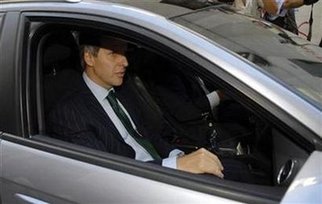Global Biz
Argentina's Central Bank president resigns
(Agencies)
Updated: 2010-01-30 13:50
 |
Large Medium Small |
BUENOS AIRES, Argentina: Argentina's Central Bank chief resigned Friday, saying he could do no more to protect the nominally independent institution from the president's efforts to control its dollar reserves.
 Argentina's former Central Bank President Martin Redrado arrives at the Central Bank in Buenos Aires January 8, 2010. [Agencies] |
"I went through all the institutional steps," he said. "Unfortunately, the government didn't do the same and disregarded the independence of the Central Bank."
The president ordered Redrado fired this month after he refused her decree to make the bank's reserves available for paying off $6.6 billion in national debt and also for spending of undefined "excess reserves" for other purposes.
The Central Bank has about $48 billion in reserves, and some analysts said the decree's wording would enable the president to unilaterally use more of it for other spending.
A judge blocked Fernandez's decree and a congressional panel had been considering whether to approve or reject it.
Fernandez had urged the panel to rule quickly to resolve the crisis.
| ||||
"For us, the resignation doesn't exist," Anibal Fernandez told the C5N news channel, adding that the government would wait for the congressional panel's decision.
Fernandez wanted the reserves to be used for a "Bicentennial Fund" to resolve court battles over bond payments after Argentina defaulted on its debt in 2001. The bond holdouts have sued in New York, becoming a key obstacle to Argentina's return to international debt markets.
Redrado refused to make the transfer, reasoning that if the central bank isn't seen as an independent institution, the bond holdouts could persuade courts to freeze Argentina's U.S. accounts.
Redrado also argued that the president could not fire the Central Bank chief without the approval of Congress.
"We've reached this situation because of the constant disregard of the institutions by the national government," Redrado said.
He had been blocked by police from entering the Central Bank since Sunday, and the institution was in the hands of its vice president, Miguel Pesce.
Argentina has Latin America's third largest economy, after Brazil and Mexico.








